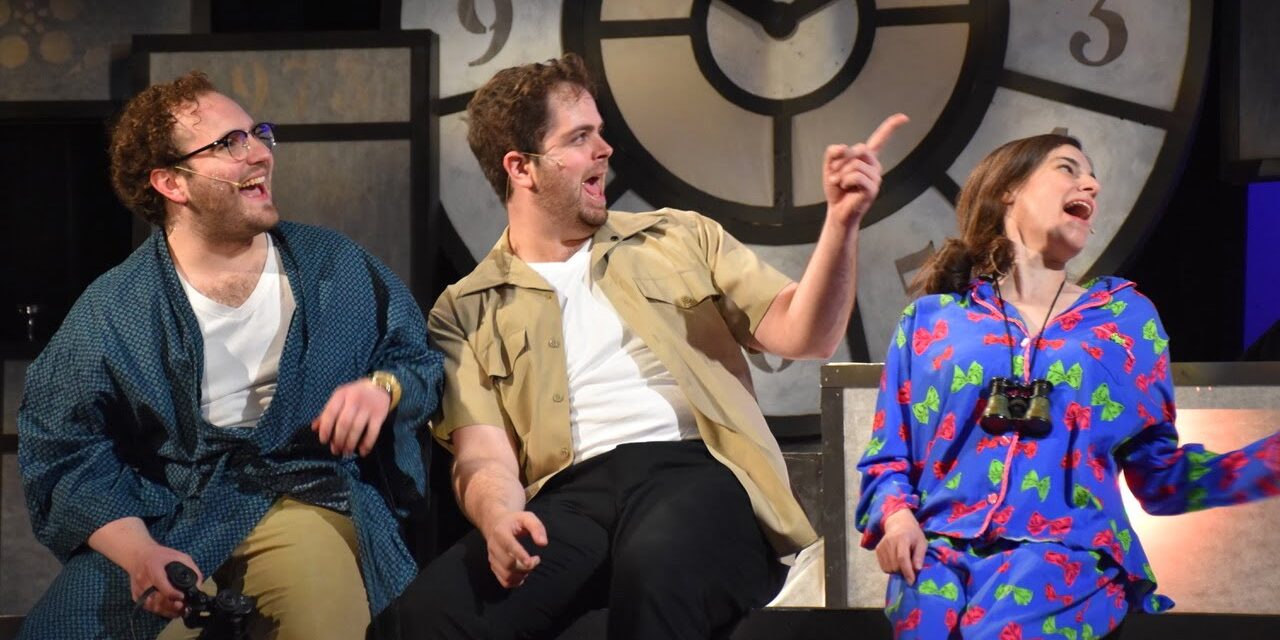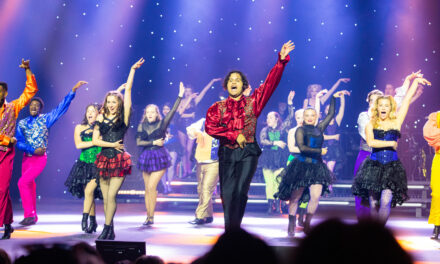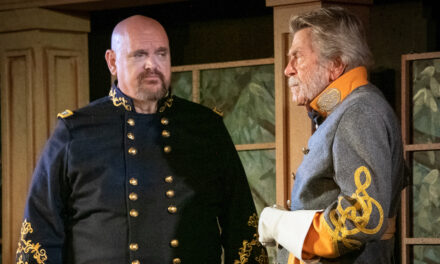And with More Passion in Delray Beach than It Did on Broadway
Theater Review by Myra Chanin . . . .
Stephen Sondheim’s Merrily We Roll Along (hereinafter MWRA), is the story of the friendships between a composer, a lyricist/playwright, and a writer, with events beginning in the present and revealed, mishap by mishap, back to the time and place where they first met. Back then, all three were talented, young, hopeful, and open-hearted, sitting on the roof of a brownstone in a not-yet gentrified neighborhood, scanning the sky for a glimpse of Sputnik.
Despite an unusually melodic Sondheim score, and Hal Prince’s backstage expertise, MWRA closed after 16 performances when it debuted on Broadway in 1981. Maybe the book was too complicated and unresolved and the actors were miscast. Even worse, it dissolved the professional association between Sondheim and Hal Prince, ending 12 years of glorious landmark productions and Tony awards for Company, Follies, A Little Night Music, and Sweeney Todd, which changed the American Musical. Subsequent efforts to make its plot more appealing failed. MWRA stayed dark for more than thirty years, until the British Friedman sisters—Producer Sonia, and Director Maria—turned it into a West End hit in 2013, receiving more five-star reviews than any show ever had.
Naturally, this new success made people think about giving it a shot on this side of the pond. First came an East Village tryout with the “Sky’s the Limit” star power at the New York Theatre Workshop. Tickets sold out as quickly as they would have under a Hogwarts graduate’s spell.
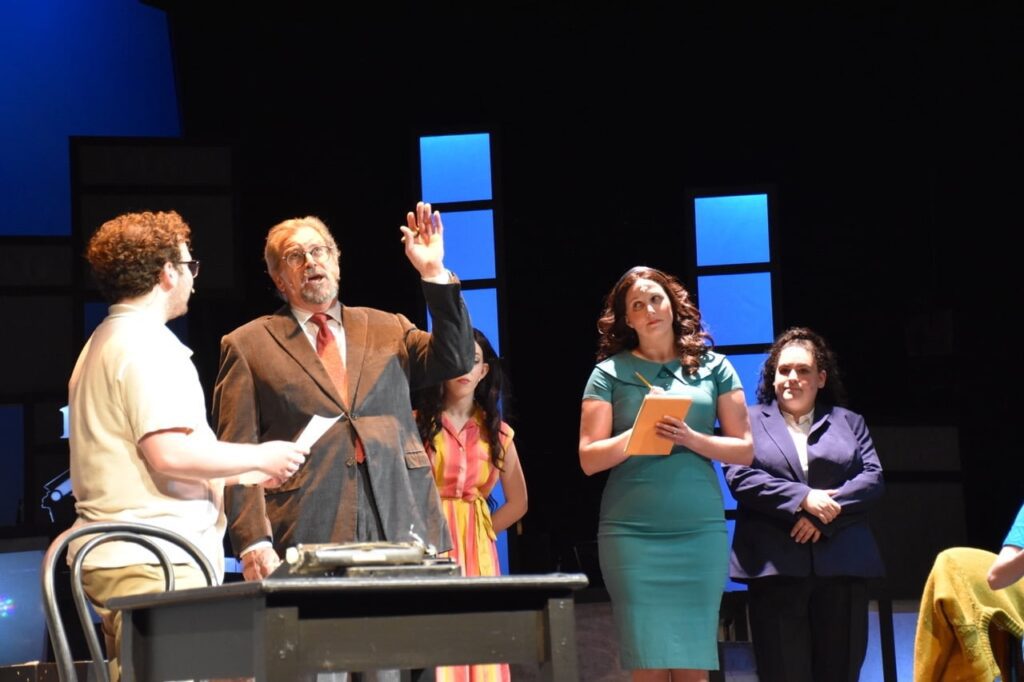
Actually, this production acquired the most important Hogwarts grad. A grown-up Daniel Radcliffe (née Harry Potter), who grew a beard and seized MWRA’s emotional core, playing the upright, honorable, Charley Kringas, the most likable character in the musical. He’s the playwright/lyricist who partnered with the easily distracted music man, Franklin Shepherd, played by Jonathan Groff who starred in Spring Awakening as Melchior and was the only non-rapper in Hamilton: King George III. Franklin is also beloved by Lindsay Mendez, a Carousel Tony winner, playing novelist Mary Flynn; but too many years as both a buddy to Frank, and a woman scorned, turned Mary into a nasty boozer—unfortunate but understandable.
The cast at the newest production—now playing through April 7 at the Delray Beach Playhouse—was not as slick as those in the current Broadway version, but they were blessed with well-trained, musically savvy local actors who immersed themselves in their roles and energized an entire audience with their passion, or fury, on stage. The leading trio of MWRA are well-known and highly regarded in the area. Bob Ruggles plays Frank Shepard; Chris Ombres is Charley Kringas; and the extraordinary Devra Seidel blows the roof off as the bitterly unhappy Mary Flynn. Also, the Delray Beach Playhouse has a 75-year history as a community theater. It treats both beginners and experienced players as equals, inasmuch as nobody gets paid for performing.
On a stage that would accommodate Barnum’s Circus, Director Andre Lancaster welcomed the welcoming crowd. He admitted that MWRA was his favorite musical and was overjoyed it was his first directorial assignment at the Playhouse. He’s been its very accomplished Technical Director since 2015 and did a great job as both. I didn’t notice a single flub.
Aidan Quintana led a live band through the opening bars of Jonathan Tunick’s spectacular orchestrations. The prickly, staccato, bright tunes are a contrast against the Krupa-ish big bass drum syncopation. Colored lights blinked in windowed columns and compartmentalized Franklin Shepherd’s Belair Mansion (circa 1976) a cleverly designed, multi-level masterpiece of understatement conceived by three first-class artisans: Scenic Designer Cindi Blank Taylor, Master Carpenter Jeff Davis, and Lighting Director Stevie Bleich, who once again demonstrate the triumph of unfettered imagination over limited funds.
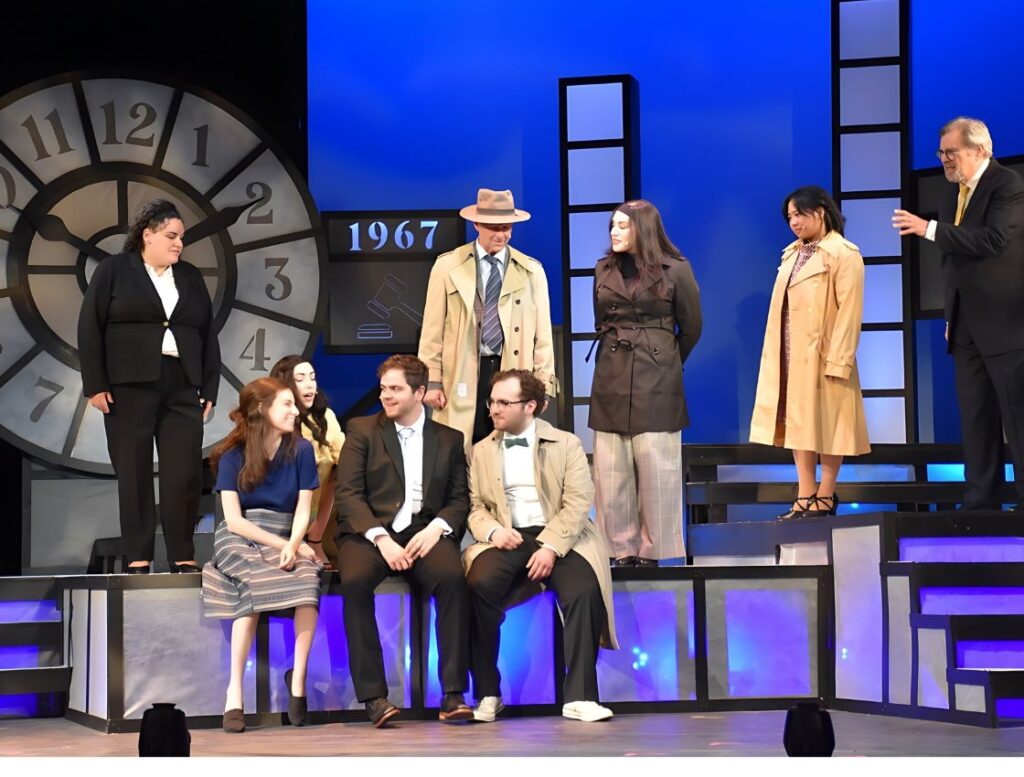

Merrily We Roll Along begins in the present and moves backward, tracing the lives of wealthy, jaded composer Franklin Shepard, and his two estranged friends through each milestone and misstep of their personal and professional lives. The happy ending adds a touch of rueful irony, as the three best friends at the start of their careers face a bright future: young, talented, and enthusiastic about the worlds waiting to be conquered. Too bad we see them disappointed in and jaded in the opening scenes. MWRA crackles with the wit, humor and intensity that embody the spirit of New York City on the make. With a brilliant “Broadway-style” score and that deep insight one expects from any Sondheim endeavor, Merrily We Roll Along is a spirited and moving cautionary tale for anyone who has ever pursued a dream.
Among the also-rans I most enjoyed was Alan Goodman’s Joe Josephson, the second husband of Gussie Carnegie (Rachel O’Hara), who was the former “other woman” in Frank’s life, who became his second wife when he became her third husband and is on her way to being discarded. The good news? The play has a troubled ending—I mean it’s actually a happy beginning. But a rather unhappy middle. We watch Frank stumble through his life, look around at the mansion, and wish he could go back to the way it was. As do Charley and Mary.
The acting and the singing are excellent, but the plot is complicated and confusing. I saw the Broadway version a few weeks ago, and loved Daniel Radcliffe’s Charley, but I found the Delray Beach Playhouse version more moving and heartfelt. There is one song that reminds me of Gilbert and Sullivan’s patter. It’s about the Kennedy family, who are all listed. It’s sung in a scene where Franklin, Charley, and Franklin’s first wife are performing it at a dumpy downtown club. It’s called “Bobby and Jackie and Jack.” The lyrics about the Kennedy family are worth looking up on information superhighway. They’ll make you smile.
Merrily We Roll Along. Through April 7 at the Delray Beach Playhouse (950 NW 9th Street, Delray Beach, Florida). www.delraybeachplayhouse.org
Photos: Cindi Taylor


